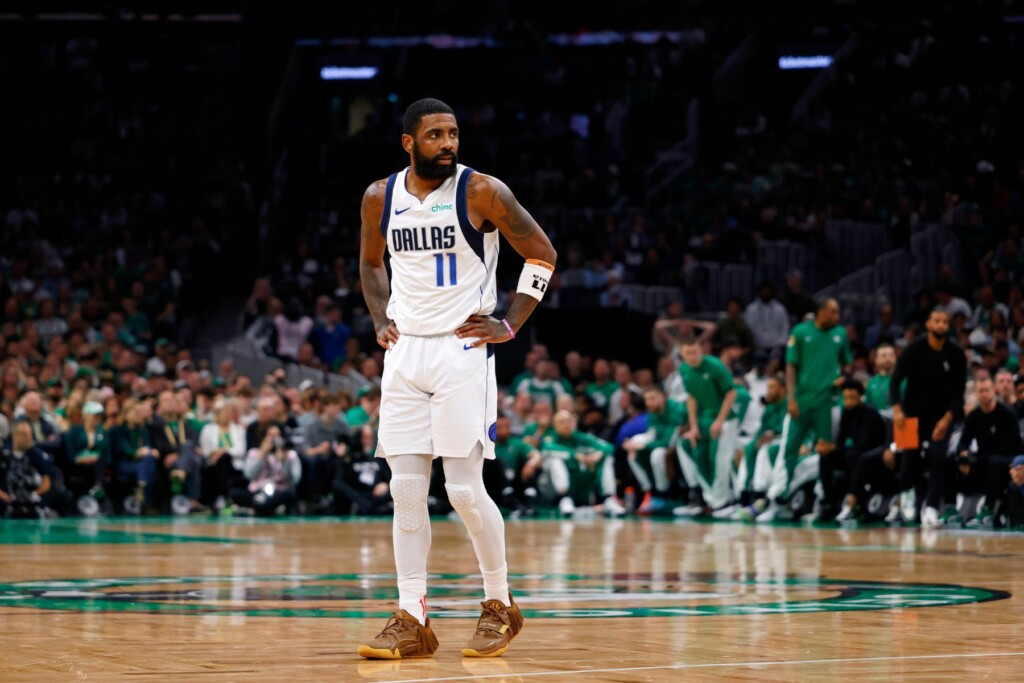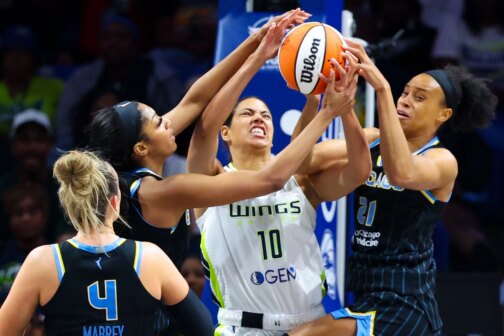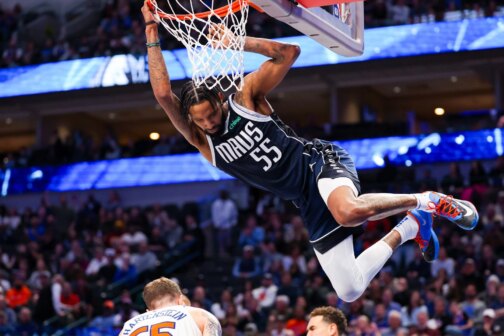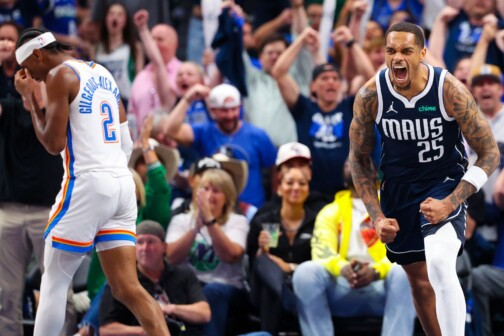Green and yellow confetti rained down and screams of joy surrounded me as I took off my headset, packed my bag, and exited the court at TD Garden in Boston on Monday night. As the pain of the Mavericks’ Finals loss kicked in, my thoughts turned to the journey Dallas took over the last 14 long months to get to this spot while falling short of the ultimate goal. Like Sisyphus with the boulder, the work begins anew: another draft and free agency, summer league, offseason workouts, training camp, two-a-days, preseason, the slog of 82 games with road trips on buses and airplanes. Then the playoffs, ever increasing in intensity as you reach the next round—just to have a chance to get back to this place. It is daunting, but that’s what makes it so sweet when you reach the mountaintop.
Luka Doncic’s free throw at 5:09 of the third quarter gave him 621 points in the playoffs, surpassing Dirk Nowitzki’s 620 for the most by a Maverick in a playoff run. It just so happened Dirk’s mark came in the 2006 playoffs, which ended in a crushing defeat to the Miami Heat in his first Finals. Doncic’s Finals debut ended in similar fashion, and the lessons from 18 years ago can serve as a guidepost in putting this season in perspective.
But let’s think back to a different Finals for a moment. In Game 2 of the 2011 Finals, the score was tied with 24.5 seconds left. Nowitzki spun past Chris Bosh for a left-handed runner to take the lead and steal Game 2. In Game 4, while feeling under the weather, Nowitzki spun to the right past Udonis Haslem to seal that win. What is interesting about both of those key moments is that those were moves Nowitzki didn’t have in 2006. The 2011 championship season doesn’t happen without 2006, and the lessons Nowitzki learned in how to improve his game both physically and mentally. As we look at this year’s Mavs, the pain of coming up short, if channeled correctly, can lead to glory in future seasons.
The similarities between Nowitzki and Doncic are obvious, from the European background and game-changing style to being franchise cornerstones breaking records on a regular basis. Another similarity is those who doubted them. Pre-title, Nowitzki’s leadership was questioned endlessly as he was labeled “soft.” Doncic’s leadership was also questioned on the national stage. The superstars get the most praise and the most questions. The reality is that the Mavs are not in the Finals in 2006 and don’t win in 2011 without Nowitzki. And the Mavs aren’t in this year’s Finals without Doncic. His brilliance is unquestioned. His answer to a question last week about what he sees on the court shows how Doncic is playing chess to his opponents’ checkers: “I just look at how long the guys have been in the paint, the low man,” he said. “If it’s time—if it’s like two seconds, he’s going to go out. I think that’s the moment to attack. Then I just try to read the game. If he comes, there’s going to be a lob open to the corner. If he doesn’t, I just try to take the layup.” Amid all the activity, Doncic is aware of how long the center has before he has to vacate the lane and then he attacks. Brilliance made to look easy.
But that brilliance doesn’t come without hard work. The physical toll of a long season is immeasurable, but Doncic never used his myriad injuries as an excuse. The emotional toll is something we can never truly understand about those who toil in the arena. Years later Nowitzki still winces thinking about 2006. “A lot of things happened in that series that don’t sit well with me,” he said. “Even now.” But as Jason Kidd put it this week, “For great players, you have to fail to understand how to be successful at the highest stage.”
That summer, Nowitzki lamented to me about a missed opportunity, a year in the prime of his career that didn’t end with a championship for his city. He went back into the gym in Germany for long hours of work when no one was watching. He perfected the moves he would use so effectively five years later. He honed his body. He came back the next year and was the league MVP. But there was still roster tinkering to be done. Progress isn’t linear. Next year’s Mavs will face a loaded West. Minnesota and Anthony Edwards are a force to be reckoned with. Oklahoma City is one of the youngest teams in the league and already has a 57-win season on its ledger. Nikola Jokic isn’t going anywhere. Ja Morant returns, while Steph Curry, Kevin Durant, and LeBron James all wear jerseys in this conference. Time waits for no one.
Doncic acknowledges there are areas in which he can improve. He has done it before. He spent last summer retooling his conditioning. In talking about his Game 3 Finals performance, he said, “Sometimes I don’t show it the right way, but at the end of the day, I really want to win. I’ve got to do a better job showing it a different way.” He showcased that growth in Game 4. And that was not an answer to the national pundits. Rather, his self-criticism and the obligation he feels to his teammates drives him. His defense in Game 4 was pivotal, and Kidd, ever the calm and steady presence, talked on Monday night about how now it is about “just a matter of being consistent.”
The greats all go through this. It is part of the journey. It doesn’t lessen the pain, but it provides perspective. Doncic noted the physicality Boston played with in the series. He and Kidd both mentioned Michael Jordan and how he had to adjust to a physical style when he had to go through Detroit in the late ‘80s. “There’s the story of MJ against Detroit,” Doncic said. “That was a big thing. I think he just learned from it. It’s a great experience. You’ve got to go through lows first to go on top. I think that’s great experience.”
On the court, the lessons were clear. Boston was a historic team with no weaknesses, a team with five two-way players. The Mavs, like Dirk and the one-dimensional jump-shooting team of 2006, have to find multiple ways to beat defenses that take away their vertical game and corner threes. Nico Harrison tinkered over the last 16 months to improve a team that didn’t even make the play-in last year. To set the table, in his words, “for the next three playoffs.” The team that reached the Finals and was underdogs in each series was together for only five months. It is comforting that the young core is in place, and Patrick Dumont will empower Harrison to continue to look for ways to maximize the roster.
For now, the pain is real, the lessons hard-earned. Kyrie Irving said on Monday night that “failure inspires.” Giannis Antetokounmpo famously said that it isn’t failure, but steps to success. Failure is when you do not put in full effort. And as Irving said, the Mavs have “learned more than anything from this series on what it takes to not only get back to this level, but win at this level.” You have to experience that to know what the next steps are.
The path is well-worn, whether it be the 2011 Mavericks learning from 2006 or the 2024 Celtics learning from 2022 and five other trips to the Eastern Conference Finals The Nuggets and Bucks endured similar journeys. As the days pass, we can allow ourselves to look back at this season and smile: Luka’s 73-point night, Irving’s 20-foot left-handed floater, the run after the moves at the trade deadline, standing on business, winning Game 5s on the road against Oklahoma City and Minnesota and the joy of the Game 4 performance in the Finals. More importantly, the moments we shared and the relationships built as fans this spring: enjoying the journey and celebrating along the way as the Mavs exceeded our wildest expectations.
I’ll remember that pain as I reflect on walking through the bowels of TD Garden, muffled celebrations off in the distance. It motivates exhausted and disappointed coaches, staff and players to stay hungry and get back to this point. I saw firsthand this organization’s relentless approach all season and especially in the playoffs. And that pain will drive me to appreciate the good times even more. I feel pride for this team and a season I will never forget. For I remember this pain is needed for what is to come.
Author






